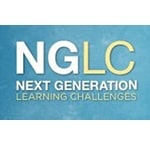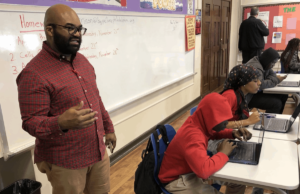NGLC Awards Innovative School Networks & Colleges

Next Generation Learning Challenges (NGLC) announced its second round of grants to innovative high school and college programs today. The $4.5 million in grants will be shared by eight high school recipients, mostly charter networks, and four colleges. The program supports whole school models likely to yeild dramatic increases in college completion by low income students.
As a reviewer for the NGLC, I had the opportunity to read about half of these applications and was pleased with the quality of the applications. We wondered if we’d be able to come up with 20 applications that would be good enough, said program director Andy Calkins but “We no longer have that doubt; the pioneers are out there.”
It was evident that blended learning has arrived—common concepts and language was used across most of the applications. (We like to think it has something to do with fact that we quote Innosight’s blended learning reports weekly on GettingSmart.com.) There was more innovative thinking about teaching and learning than there was about scaling and that’s at least partially a function of the lack of robust learning platforms—applicants were still trying to figure out how to glue stuff together. Calkins plans to work with the winners to “Develop viral expansion models that can scale geometrically, not arithmetically.”
High school grantees get a $150k planning grant and are eligible for up to $300k in one-to-one matching funds. They include:
- Academy 21 at Franklin Central Supervisory Union (VT). Academy 21, which will serve a high need, predominantly rural community with a large percentage of first generation college students, is an early college high school model, focusing on creating customized, flexible pathways that prepare all students for success in college and career.
- Cornerstone Charter Schools(MI). Cornerstone, a Detroit-based charter management organization, is opening Cornerstone Health High School in fall 2012 to prepare Detroit students for college and health-focused careers. The high school, which incorporates a complete redesign of teacher and student roles, will have strong community ties and a deeply embedded partnership with Detroit Medical Center.
- Da Vinci Schools (CA). For its new, next generation learning school, Los Angeles-based Da Vinci Schools is integrating blended learning, early college, and real world experiences with the project-based approach of its three existing charter schools.
- Education Achievement Authority (MI). EAA, Michigan’s statewide turnaround school authority, will create a student-centered system of education where students are organized by instructional level rather than grade level and progress via mastery rather than seat time. EAA’s approach, which will be supported by a custom-designed learning management system, will be introduced in a K-8 school in Detroit this fall and will be rapidly scaled up to other EAA-managed schools in subsequent years.
- Match Education (MA). Match Education operates charter schools for low-income students in Boston and trains teachers. Its schools are among the highest-performing in Massachusetts. Match Education will seek to open a new charter school in the fall of 2013. The school will be designed on Match’s model of one-on-one tutoring and will use technology to customize teaching and learning.
- Schools for the Future (MI). Schools for the Future is a transformative recuperative college prep model for youth performing significantly below grade level in reading and math proficiency. SFF combines cutting-edge youth development practices in five domains: competency-based progression to graduation, a unique blended curriculum, a program to build cognitive confidence and self-efficacy, real-time student performance analytics, and online and community-based learning opportunities through mobile technology.
- Summit Public Schools (CA). Summit Public Schools, a California-based charter management organization, is designing a next generation competency-based school model for grades 6-12. Summit’s new learning model will build on the successful practices of its current network of schools.
- Venture Academies (MN). Venture Academies, a new Minneapolis-based charter management organization, plans to open a school serving grades 6-12 in fall 2013 that focuses on personalized and mastery-based learning, accelerated college credit attainment, and cultivation of entrepreneurial leadership.
The college grantees represent efforts to “significantly improve student access, persistence, and completion, without compromising the quality of learning outcomes.” Applicants were eligible for awards up to $1 million and include:
- New Charter University ($300,000). New Charter University provides free access to online college courses, only charging students who want to apply those courses toward a degree. NGLC will fund research (conducted in conjunction with the Community College of the District of Columbia), rather than the development of New Charter’s model, to assess its effectiveness in a comparative and mixed-method study of students enrolled entirely online versus others who additionally receive support on campus.
- Northern Arizona University ($1,000,000). Northern Arizona University is developing a Personalized Learning Division, where students will pay tuition based on the length of time they take to complete courses and demonstrate competency, making it an incentive-driven, competency-based approach.
- Southern New Hampshire University ($1,000,000). Southern New Hampshire University is pioneering the Pathways Project, which will offer an associate degree with content and assessment delivered online in a self-paced model. Learning will be organized by an individualized Knowledge Map that acknowledges what students already know, reflects what employers need, and aligns with student goals.
- Texas Higher Education Coordinating Board ($1,000,000). The Texas Higher Education Coordinating Board, South Texas College and Texas A&M University-Commerce, will offer a technology-enabled Bachelor of Applied Sciences with an emphasis on organizational leadership. Students will earn credits in a self-paced, year-round format that can reduce time-to-degree to 1.5-3 years, depending on prior education and work experience.
NGLC is hosted by EDUCAUSE, the IT in higher ed folks, and sponsored by Gates and Hewlett. The release notes that “NGLC has awarded nearly $23 million in grants to 65 organizations and institutions focused on piloting and scaling new school and degree models, compiling evidence of what works, and accelerating adoption by creating cohorts of change agents.”
The grant winners are well deserving recipients that emerged from a well managed process. NGLC is a great program—we need a similar innovative new school development effort in every urban area of the country.
For more, see Andy’s blog on the last round of grants, Xtreme-Education Reform, and these three blogs for a recap on why new school development is so important: A Tale of 5 Cities: Portfolio Strategy Revisited, Improving Urban Education Options: A Digital Portfolio Approach, and 10 Reasons Every District Should Open a Flex School.





0 Comments
Leave a Comment
Your email address will not be published. All fields are required.